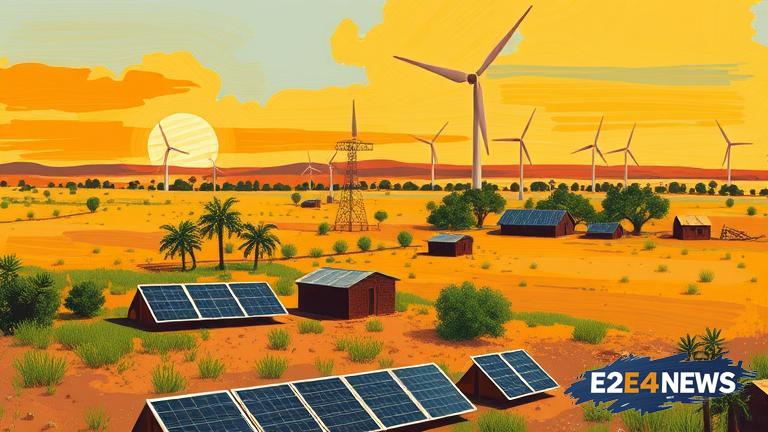The African continent is witnessing a significant shift towards renewable energy, driven by the need to address the pressing issues of energy access, climate change, and sustainable development. With many countries still struggling to provide electricity to their populations, renewable energy has emerged as a viable solution. Solar and wind power are becoming increasingly popular, with countries like South Africa, Egypt, and Morocco leading the charge. The cost of renewable energy technologies has decreased dramatically over the years, making them more competitive with fossil fuels. This has led to a surge in investment in the sector, with many international companies and organizations committing to support Africa’s renewable energy ambitions. The African Union’s Agenda 2063 has set a target of ensuring access to clean and affordable energy for all Africans by 2030. To achieve this goal, the continent will need to increase its renewable energy capacity significantly. Several countries have already made significant strides in this direction, with Kenya, for example, aiming to generate 70% of its electricity from renewable sources by 2025. Rwanda has also set an ambitious target of becoming a carbon-neutral economy by 2050. The use of renewable energy is not only beneficial for the environment, but it also has the potential to create jobs and stimulate local economies. In fact, a report by the International Renewable Energy Agency (IRENA) estimates that the renewable energy sector could support up to 24 million jobs globally by 2030. Africa’s renewable energy revolution is also being driven by the need to reduce dependence on fossil fuels, which are not only harmful to the environment but also subject to price volatility. The African Development Bank has committed to supporting the development of renewable energy projects on the continent, with a focus on solar, wind, and hydro power. The bank has already invested in several high-profile projects, including the Noor-Ouarzazate solar power plant in Morocco, which is one of the largest in the world. Other organizations, such as the World Bank and the European Union, are also providing significant support to Africa’s renewable energy sector. Despite the many benefits of renewable energy, there are still several challenges that need to be addressed, including the lack of infrastructure and the high upfront costs of investing in renewable energy technologies. However, with the right policies and support in place, Africa’s renewable energy revolution has the potential to transform the continent’s energy landscape and support sustainable development. The private sector is also playing a crucial role in driving the growth of renewable energy in Africa, with many companies investing in solar and wind power projects. In fact, a report by BloombergNEF estimates that renewable energy investments in Africa could reach $50 billion by 2025. This investment has the potential to create thousands of jobs and stimulate local economies, while also reducing greenhouse gas emissions and mitigating the impacts of climate change. As the world continues to transition towards a low-carbon economy, Africa’s renewable energy revolution is likely to play an increasingly important role. The continent’s abundant natural resources, including solar and wind power, make it an ideal location for renewable energy investments. With the right policies and support in place, Africa has the potential to become a global leader in the renewable energy sector, supporting sustainable development and reducing its dependence on fossil fuels.





